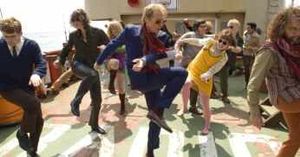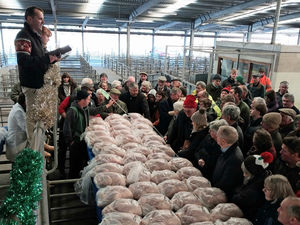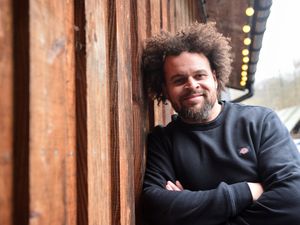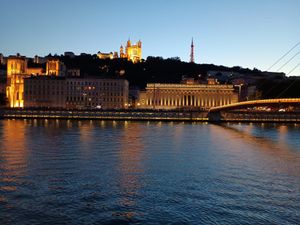Dee-constructing The Boat That Rocked
The days of pirate radio, when rebel DJs bent the law by broadcasting from ships on the high seas, are fondly recalled this week in a new big-screen movie. Two former Shropshire schoolboys were at the heart of the revolution.

http://www.youtube.com/watch?v=e9oY-OhiXG0
Cyril Nicholas Henty-Dodd was, apparently, no name for a rock and roll DJ.
The former Shropshire schoolboy, who brought the sounds of The Beatles and Rolling Stones to our ears through revolutionary floating pirate radio station Radio Caroline in the 1960s, needed reinvention for the role.
"When we began Caroline, sitting out there in the middle of the North Sea putting on LP tracks in a force nine was a challenge we overcame – a chap named Henty-Dodd couldn't exactly introduce The Stones!" he recalled in a letter to the Shropshire Star.
"So I adopted Simon Dee as a stage name, and so it remained."
This week sees the release of the eagerly anticipated movie, The Boat That Rocked, about a fictional pirate radio station. The movie centres on pirate radio's heyday when offshore ships defied the law by broadcasting rock and roll 24 hours a day and revolutionised the airwaves forever.
It coincided with arguably the most exciting era in pop history, and incredibly not one but two former Shrewsbury School boys – Dee and later John Peel – were responsible for being part of it.
Today, aged 73 and living in Winchester, Dee declines to talk about his time on Caroline unless he is given a couple of hundred quid. Eager to learn more about this fascinating time in pop history, my conversation with the man is sadly short and, to be honest, not particularly sweet.
He admits to being "a little upset that I did not receive an invitation to the premiere considering I started it all." And he certainly did that – Dee's voice would become one of the most important in music broadcast history. On March 30, 1964, his was the first to be heard on Radio Caroline, one of the pirates broadcasting popular music from ships outside UK territorial waters.
Just six weeks into transmission, a fresh-faced and enthusiastic Dee was interviewed aboard Caroline against the crackle and fuzz of 7-inch single spinning in the background.
"It's all happening and it's great to be in the middle of it all," he says.
Asked what he didn't like about the job, he replies: "I don't like not getting enough sleep, but apart from that it's fine."
Admitting he started the day "tired" – understandable when he was getting up at 5am – he explains his typical day on the North Sea.
"We turn the transmitters on then we run through some test tapes, put the records on, decide which records we are going to play, put those on and test them for levels – the carrier wave and modulation and so on. Then we start transmitting at six, and we go on through the day, changing record shows, different DJs taking over."
He'd have tea and be tucked up in bed by 7pm, ready to start all over again the next day.
http://www.youtube.com/watch?v=e9oY-OhiXG0
In the interview he is asked how much he is being paid. Says Dee: "I haven't seen any money since I've been on actually. I haven't seen one cent."
Asked if he supposed it was piling up somewhere, he answers: "I suppose it is – I don't know how much I'm being paid though. Honestly I don't. I've no idea. I'm being paid in blood and sweat at the moment."
Within a few months, he was so famous he was offered a job on the BBC Light Programme in 1965, introducing a late-night show on Saturdays. He also worked on Radio Luxembourg and for a short while after BBC Radio 1 opened in 1967 Dee introduced the Monday edition of Midday Spin and sometimes presented Top of the Pops.
Of course, Shropshire has more than one claim to fame when it came to bringing a new pop soundtrack to Britain through pirate radio in the swinging sixties.
John Peel, another former Shrewsbury School pupil, was instrumental in revolutionising the way music was brought into our homes. After a spell working as a DJ in the States, Peel, who died in 2004, joined the offshore pirate station Radio London in 1967 at the height of flower power and worked the graveyard shift from midnight to 2am.
In his autobiography he writes: "At the time I was coming to the end of a fairly catastrophic marriage . . . my wife was amazingly aggressive and she hit me a lot and so I was pleased to be on the ship for two weeks out of three. . .
"There was a play list and commercials that had to be done but after midnight I virtually did away with them – I didn't bother to do the news or the weather or anything. Just to do two hours of records and reading other people's poetry very badly."
It was aboard the good ship Radio London that Peel, with his confessional tone, made a name for himself and by the final week of Radio London he was receiving far more mail than any other DJ on the station.
Not for him the commerciality of his fellow disc jockeys, the intimacy of his delivery was his appeal. It was as though he was always operating through pirate radio, even in later life when he was spinning obscure discs from his Norfolk home to mainstream BBC radio audiences.
And, uniquely, when the champion of genuine musical talent played a new track it was as though he was sharing a secret with you. Today the pirate ships may have been grounded; the good ship Peel sails on, albeit without its captain.
If you've got a spare few hundred quid, maybe you can ask Simon Dee what he makes of it all.
The Boat That Rocked will be reviewed in tomorrow's Shropshire Star




